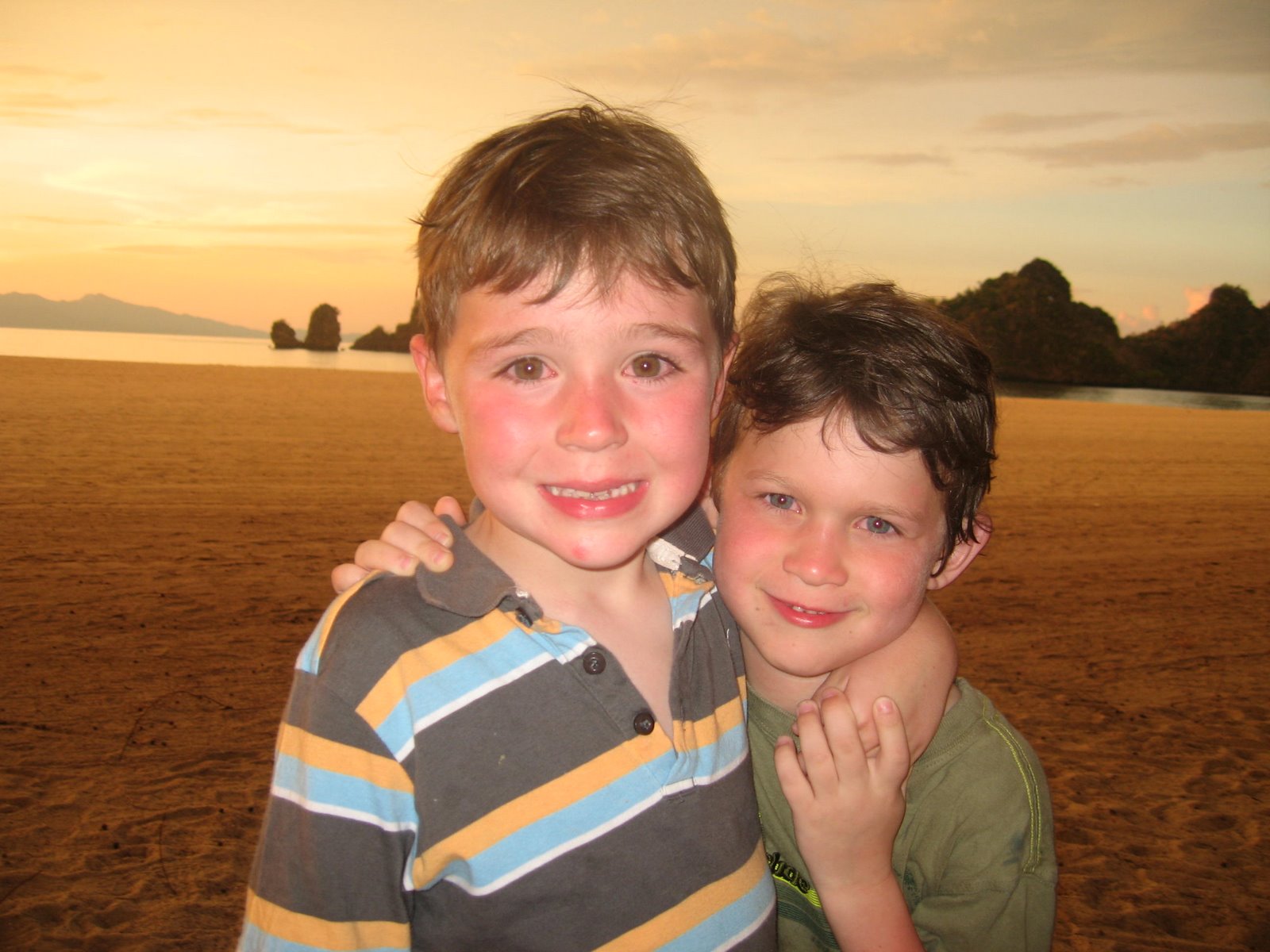The downside of being an expat: Saying Good Bye

Eli and Hugo on the beach in Malaysia. Ah, expat life.
Going through some old files looking for something and I came across this 2007 The Expat Life column about the sadness that descends every June as dear friends move on. Just thought I’d share.
**
Summer is the transient time of the year in our notoriously transient expat community. As soon as school is out, people are on the move. Within days of school letting out last June, friends had begun departing for Shanghai, Singapore, San Francisco, Sydney, Cleveland and Helsinki. These people are both returning home and moving on to their next assignment, in approximately equal numbers.
People who have lived this lifestyle for a long time manage to shrug it off, attending one bon voyage party after another then moving on. Last year as expat newbies we were a bit staggered by the process, which was already easier in this, just our second year. The volume of movement is quite disconcerting, but what else can you do but bid your friends best wishes and keep moving?
It’s not always so simple for the children. Last year our eldest son Jacob lost his first two best friends in Beijing. He was thrown for a major loop by this, but adjusted pretty easily and has stayed in touch with both buddies. We visited Javier Wong in San Francisco over Christmas break and saw Andrew Moy in Washington DC in August. Both times, the boys reconnected like they’d seen each other the day before.
This year it’s Jacob’s little brother Eli who suffered a big loss, as his dear friend Hugo’s family moved to Singapore. Eli has suffered more than any of us from leaving friends and family behind in the U.S. and I feared the worst when I learned about Hugo’s impending move.
I thought back to when we first met Hugo’s family, on vacation in Thailand. Playing on the beach, Hugo asked my boys if they could be friends forever.
“Sorry, no.” Jacob replied, acting as the spokesman. “We actually live in New Jersey and we’re just in China for three years.”
“Oh,” Hugo replied. “Can we be friends for three years then?”
“Sure.”
Hugo smiled; three years is forever to a five-year-old.
The whole conversation struck a chord with me, revealing something about our current existence, beginning with the fact that it took place in Phuket, a place I never really thought I’d visit. Eighteen months later, Hugo became another long distance friend, moving on to another place of which I was only dimly aware just two years ago. It was further evidence of how much worldlier my kids are than me.
Eli took the news surprisingly well – partly because it was tenderly delivered by Hugo’s father, rather than me — but it only reinforced his generally pessimistic assessment of expat living, which he views as an endless series of heartbreak. I often try to explain to him how his life is only richer for this experience.
“Everyone in America is still there and we still love them and they still love us,” I tell him. “And now you also have all these great new friends. After we go back to America, we’ll have friends in Australia, Hong Kong, China, England…”
I’m telling him a kids’ version of “It’s better to have loved and lost than never to have loved” and he doesn’t buy it any more than anyone else hearing this bromide while nursing a broken heart. When I tried this approach yet again in the wake of Hugo’s departure, Eli performed an interesting bit of rhetorical judo on me.
“Now we’re stuck,” he said.
“What do you mean?”
“We know we’re not going to always live in the same place as the Ohlssons (Hugo’s family) or the Camerons (his best friend Race’s family). That means we will always miss them and be sad.”
“But we’ll have new friends all over the world, and we’ll still be able to see a lot of them at special times.”
Eli was having none of it.
“We were fine before,” he insisted. “Now we’re stuck.”
These conversations make me pause and worry a bit about my sensitive son, but they haven’t shaken my belief that this experience will be long-term positive for the kids. Hopefully, as Jacob and Eli lose soul mates year after year, they appreciate their ability maintain those relationships, even while forming new ones. In any case, August and September are a time for optimism; the moving trucks filling our compound lanes these days are bringing people in, not out.




